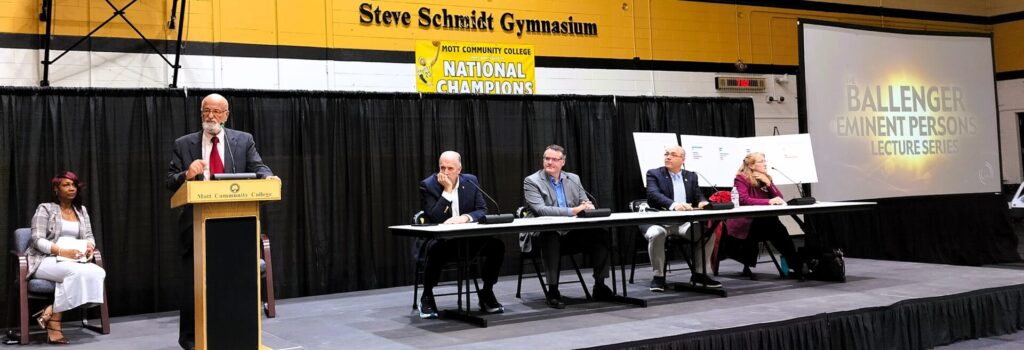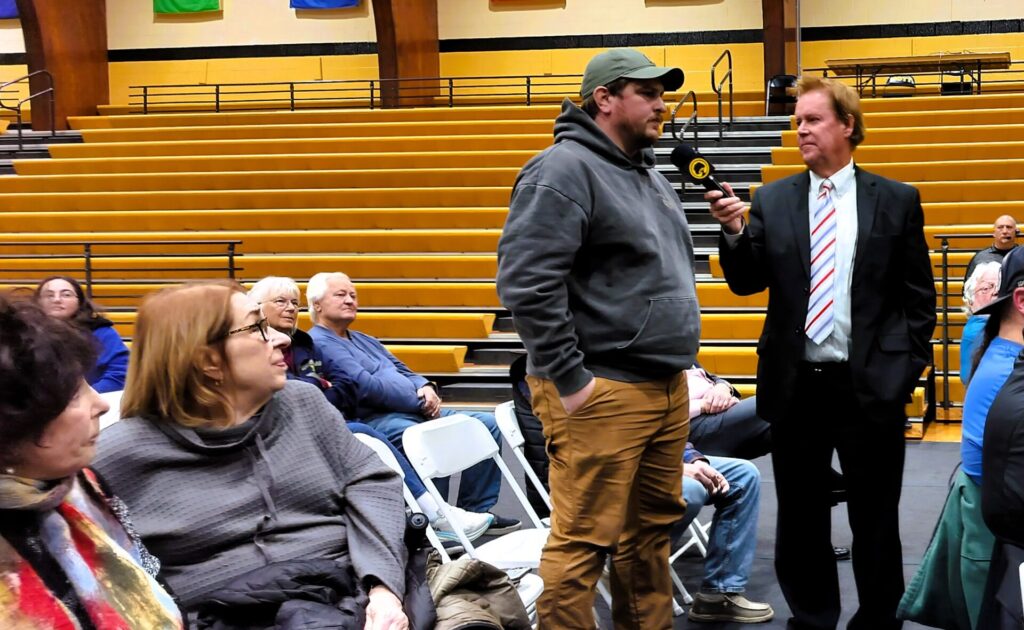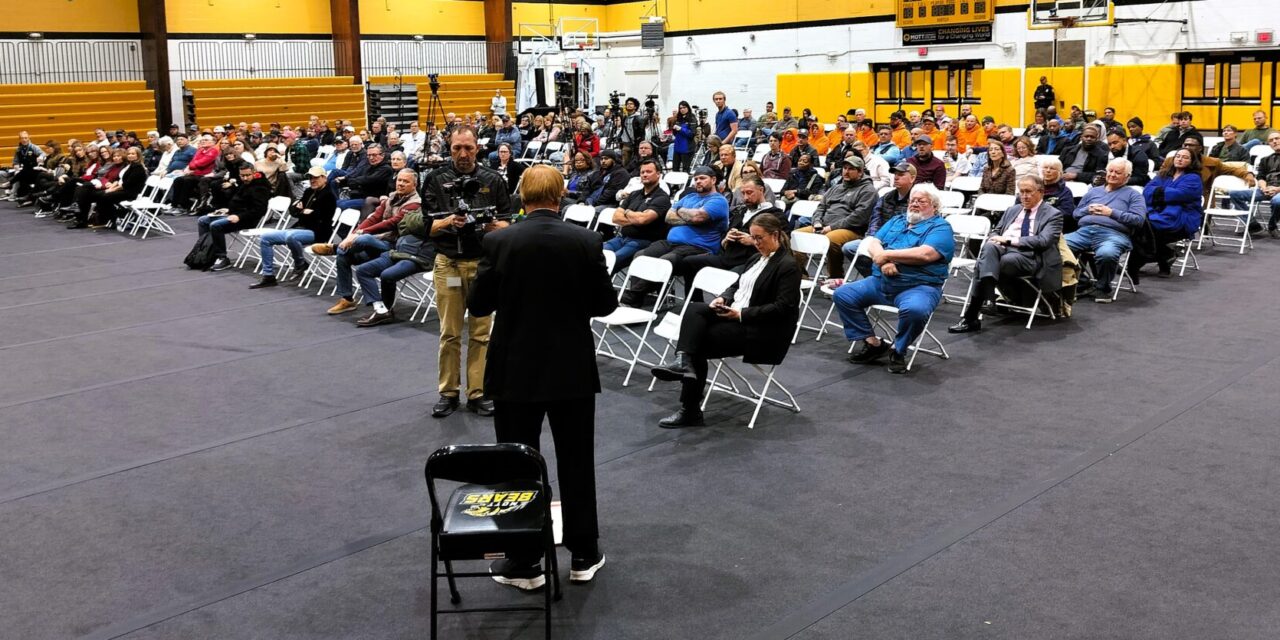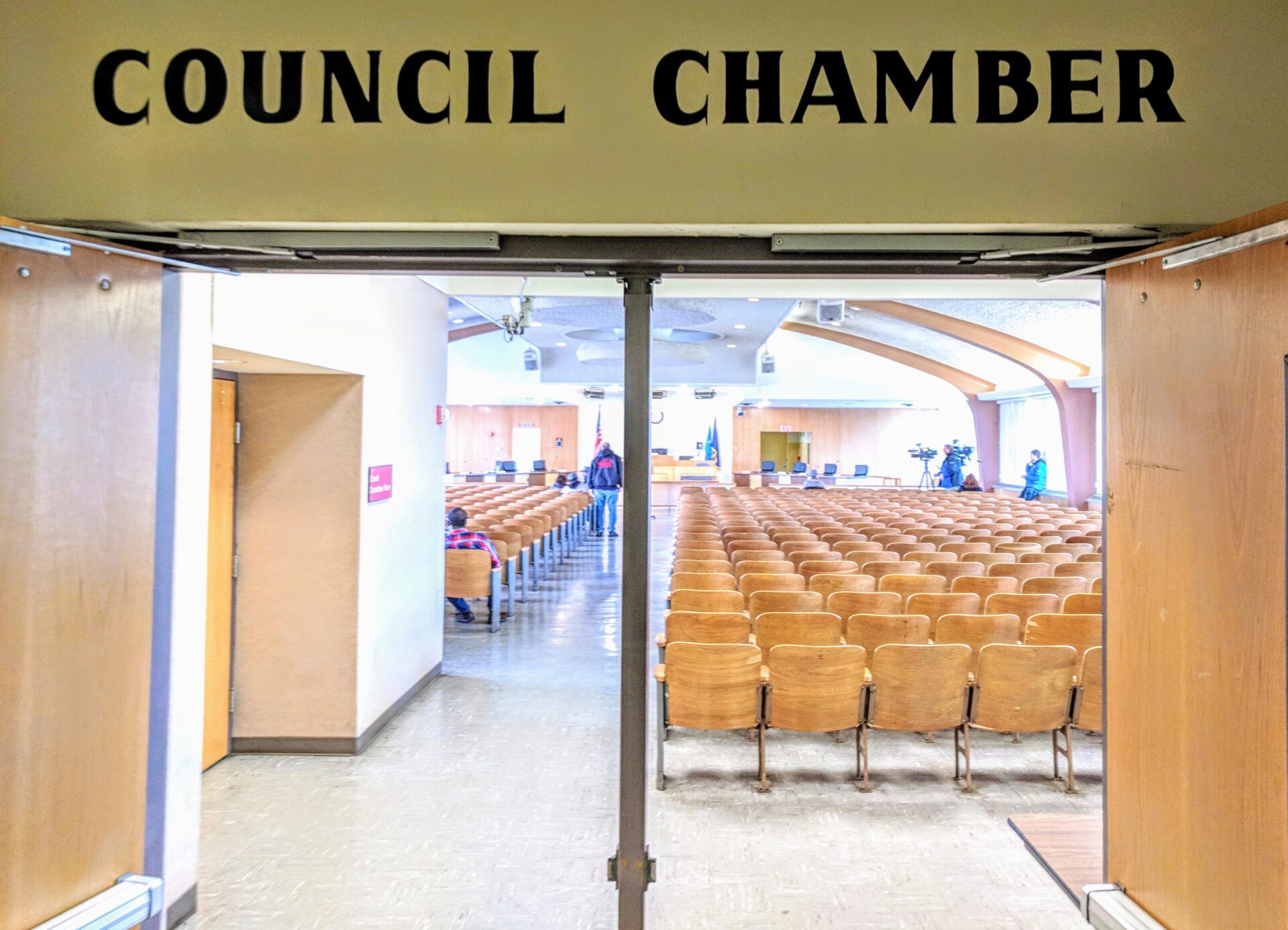By Paul Rozycki
The recent public forum discussing the proposed Mundy Township megasite outlined four important points.
- After losing nearly 70,000 GM jobs in recent decades, Genesee County needs more well-paying jobs. Should the state fund efforts to create those jobs?
- The proposed Mundy Township megasite raises serious quality of life and environmental concerns for those living there.
- Finding common ground between those two positions can be complex and difficult.
- In our divisive times is it possible to have a civil discussion over even the most challenging and complex issues.
The forum was a part of the Ballenger Eminent Persons Lecture series, which has been presenting important speakers since the early 1950s. More than 200 people attended the event, held in the Ballenger Field House on the Mott Community College campus, on November 13, 2025.
On the forum’s panel were Dan Kildee, former congressman and President of the Community Foundation of Greater Flint, and John Cherry III, state Senator from the 27th district. Both Kildee and Cherry generally supported the megasite project. Speaking against it on the panel were James Hohman, Director of Fiscal Policy at the Mackinac Center for Public Policy and JoAn Mende, a local engineer and Mundy Township resident who has testified before a State House Subcommittee on the megasite development.
Bill Ballenger III, introduced the speakers and moderator journalist Jim Kiertzner, and outlined the key question in the debate: “Should state government use taxpayer dollars to fund economic development to create jobs by offering it to private corporations…to locate in Michigan?”
Ballenger said that the question had implications that went far beyond Genesee County and Mundy Township and was important for both the state and the nation to address.
A brief history of the megasite
The megasite in Mundy Township is a roughly 1,300 acre area bounded by Hill, Maple, Elm, and Jennings roads in southwest Genesee County. As reported by WNEM 5, the megasite was projected to bring nearly 10,000 jobs and $63 billion in new investment to the county, but the company set to purchase the site, Sandisk, bailed out of the deal early this summer, blaming uncertain federal policy.
Now, the megasite’s future is unclear, but after over $260 million of state investment and federal incentives that did not come through, a path forward for is still being sorted. Much of the initial negotiations around obtaining property for the megasite were kept private as many of those involved signed non-disclosure agreements (NDAs). Residents continue to object to the secret nature of the project’s details, among other environmental and residential concerns, while supporters still hope the development will attract another company with similar benefits for the area.

In support of the megasite
Kildee said that we need to create jobs and can’t afford to “take ourselves out of the game” as we compete with other states for jobs and economic development. While he took a position favoring the process he said “that we should get away from this binary approach” and work together.
Kildee also noted the need to develop a large tax base to provide high-quality public services, and that he understood the view that the government should not help particular corporations but that there needs to be an industrial policy that may require support for some economic growth. If other states are offering benefits for companies, Michigan can’t stand down and lose the opportunities. “The way to attract jobs is to be ready to attract them” with appropriate support, he said.
Kildee also argued that for many years in the past Genesee County has benefited from the City of Flint hosting major industrial sites. He said that we “can’t say that we need the jobs in someone else’s neighborhood” and that we need to listen to the communities affected and ensure there are major environmental regulations to protect communities.
The former congressman said he agreed with many of the site’s criticisms and said “we need to do better with these kind of projects,” but there should also be programs for communities facing distressed economies like Flint and Genesee County. He argued that the county needed to diversify its economy and the megasite project might be a way to do that. He said that whatever the misgivings about the location, the Mundy Township land is well located near Interstate-75, Interstate-69, railroads, and Bishop Airport.
Cherry said that the loss of jobs in Genesee County over the years made it critical for the state to do whatever it could to bring jobs and economic growth to the county. He said that the NDAs that were signed in the development process should not be part of a lawmaker’s role and was sympathetic to those critical of them. He also cited that other states with new developments, such as Ohio, Indiana, and New York, were able to offer incentives to companies and those incentives were “necessary evils” in the world today if Michigan wanted to compete.
In opposition to the megasite
Hohman argued that the “normal order of things” is for businesses to pay their own way and that the state should not be picking winners or losers in a market economy by giving money to particular companies. He also argued that many of “these big deals don’t work” and that while they promise to create many jobs and economic growth they rarely deliver on those promises. He suggested that there might be an interstate compact to prevent “corporate welfare,” and he listed a number of similar projects, supported by government funds that produced few jobs, and that the private sector has been more successful in creating jobs.
Mende, a Mundy township resident, said that the concerns of the township residents were being ignored in the process of developing the project. She said they were concerned over environmental and health concerns, adding that the state was harming the rural nature of the township and that the township was not the best location for such a megasite.
She argued that once the farmland is “ruined” it can’t be restored and that current regulations wouldn’t protect the land. She offered charts of other companies in Saginaw with similar developments that had avoided being near residential areas. She argued that as a business owner she felt her tax dollars were helping other businesses rather than existing ones.

Comments from the public
As the public weighed in, comments reflected both sides of the issue but many also recognized the value of the arguments on the other side.
Several spoke of the desire to give their kids an opportunity for good jobs and careers in Genesee County given the site’s promise of new economic growth. They noted their fears that otherwise they might have to leave the area to find solid employment.
Others argued that the non-disclosure agreements that were part of the development process were not the role that governments should play. Many complained that they were not informed of the process as it developed and felt too much was done without public input.
Several Mundy township residents expressed the worries that a new development would destroy the environment and the property values of nearby residential areas, and some other commenters were critical of the state’s role in giving money to economic interests for development but also understood that if Michigan didn’t other states would.
Others were critical of the fact that with Sandisk pulling out, the huge area of land is now sitting there with no certain future plans. Some asked if there were any guarantees for future development and asked if that development would be there for the long term.
One resident argued that existing land like Buick City in Flint would be more appropriate for such a development and that there should be appropriate environmental controls to protect residents, particularly with the semi-conductor industry. On the other hand, with Flint’s history of water problems, several were concerned about possible water pollution.
There were also a number of union members in the audience and some shared their hope that the jobs created would be union jobs.
A personal take
What was most striking for me about the forum was that even though the issues presented were important and opinions were strongly divided, the discussion was informed and civil.
On many occasions a speaker would say to someone he or she disagreed with: “I see your point, I agree with it, but…” in a courteous way.
Yes, people did clap and cheer for those they agreed with, but, unlike many Flint City Council meetings, school board meetings, or congressional hearings, there were no insults, shouting, or name calling.
In summary, Kildee said that the civil debate was valuable and “one that I couldn’t have had in Washington.”
He added, “I much prefer the debate here tonight.”
Moderator Jim Kiertzner expressed hope that there would be more community forums like the Nov. 13 event in the future. I hope so, too.








You must be logged in to post a comment.